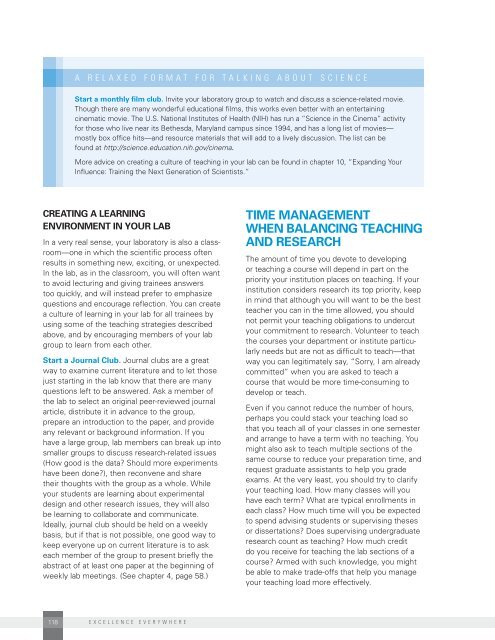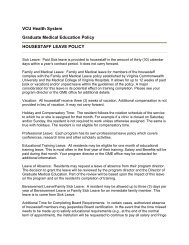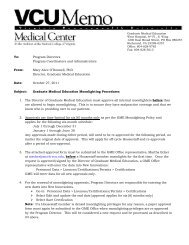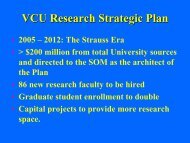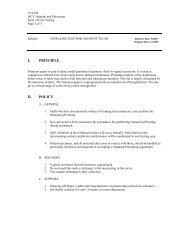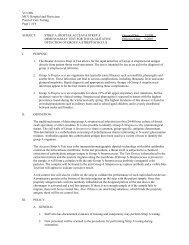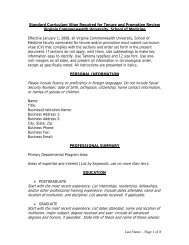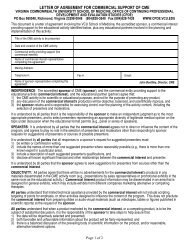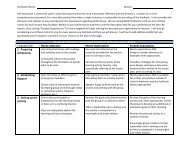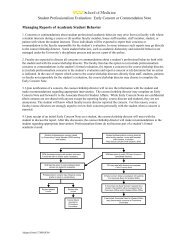a relaxed format for talking about scienceStart a monthly film club. Invite your laboratory group to watch and discuss a science-related movie.Though there are many wonderful educational films, this works even better with an entertainingcinematic movie. The U.S. <strong>National</strong> Institutes <strong>of</strong> Health (NIH) has run a “Science in the Cinema” activityfor those who live near its Bethesda, Maryland campus since 1994, and has a long list <strong>of</strong> movies—mostly box <strong>of</strong>fice hits—and resource materials that will add to a lively discussion. The list can befound at http://science.education.nih.gov/cinema.More advice on creating a culture <strong>of</strong> teaching in your lab can be found in chapter 10, “Expanding YourInfluence: Training the Next Generation <strong>of</strong> Scientists.”Creating a LearningEnvironment in Your LabIn a very real sense, your laboratory is also a classroom—onein which the scientific process <strong>of</strong>tenresults in something new, exciting, or unexpected.In the lab, as in the classroom, you will <strong>of</strong>ten wantto avoid lecturing and giving trainees answerstoo quickly, and will instead prefer to emphasizequestions and encourage reflection. You can createa culture <strong>of</strong> learning in your lab for all trainees byusing some <strong>of</strong> the teaching strategies describedabove, and by encouraging members <strong>of</strong> your labgroup to learn from each other.Start a Journal Club. Journal clubs are a greatway to examine current literature and to let thosejust starting in the lab know that there are manyquestions left to be answered. Ask a member <strong>of</strong>the lab to select an original peer-reviewed journalarticle, distribute it in advance to the group,prepare an introduction to the paper, and provideany relevant or background information. If youhave a large group, lab members can break up intosmaller groups to discuss research-related issues(How good is the data? Should more experimentshave been done?), then reconvene and sharetheir thoughts with the group as a whole. Whileyour students are learning about experimentaldesign and other research issues, they will alsobe learning to collaborate and communicate.Ideally, journal club should be held on a weeklybasis, but if that is not possible, one good way tokeep everyone up on current literature is to askeach member <strong>of</strong> the group to present briefly theabstract <strong>of</strong> at least one paper at the beginning <strong>of</strong>weekly lab meetings. (See chapter 4, page 58.)Time ManagementWhen Balancing Teachingand ResearchThe amount <strong>of</strong> time you devote to developingor teaching a course will depend in part on thepriority your institution places on teaching. If yourinstitution considers research its top priority, keepin mind that although you will want to be the bestteacher you can in the time allowed, you shouldnot permit your teaching obligations to undercutyour commitment to research. Volunteer to teachthe courses your department or institute particularlyneeds but are not as difficult to teach—thatway you can legitimately say, “Sorry, I am alreadycommitted” when you are asked to teach acourse that would be more time-consuming todevelop or teach.Even if you cannot reduce the number <strong>of</strong> hours,perhaps you could stack your teaching load sothat you teach all <strong>of</strong> your classes in one semesterand arrange to have a term with no teaching. Youmight also ask to teach multiple sections <strong>of</strong> thesame course to reduce your preparation time, andrequest graduate assistants to help you gradeexams. At the very least, you should try to clarifyyour teaching load. How many classes will youhave each term? What are typical enrollments ineach class? How much time will you be expectedto spend advising students or supervising thesesor dissertations? Does supervising undergraduateresearch count as teaching? How much creditdo you receive for teaching the lab sections <strong>of</strong> acourse? Armed with such knowledge, you mightbe able to make trade-<strong>of</strong>fs that help you manageyour teaching load more effectively.118 excellence everywhere
Borrow, Adapt and Recycle.n Teach the same course several times, so thatyou are just making adjustments to it rather thanstarting from scratch every year.n Teach a course previously taught by someone whois willing to lend you copies <strong>of</strong> his or her notes,exams, and homework assignments.n Borrow or adapt high-quality curricula that arealready available. Curricula and sometimes lecturesfrom courses from universities worldwide arecollected at the Open Courseware Consortium’sWeb site, http://www.ocwconsortium.org. Linksinclude the more than 1800 courses now onlinefrom the Massachusetts Institute <strong>of</strong> Technology,the courses <strong>of</strong> the UK’s Open <strong>University</strong>, materialsfrom several Spanish, Mexican and Colombianuniversities, a translation project renderingmaterials into Portuguese, and technical coursesfrom 11 universities in Paris.Know Yourself.n Consider your personal rhythms. If you have anyinfluence over scheduling, choose a class that doesnot completely disrupt your day. For example, youcould teach two back-to-back classes or scheduledays without classes to help you find time for yourresearch.n Set realistic limits on your own class preparationand do not be a perfectionist.The Teaching PortfolioYou want to make sure that your teaching successesare favorably considered as part <strong>of</strong> yourpromotion review. One way to do this is to developa teaching portfolio. This document is an importantasset—not only for your career, but also for yourown pr<strong>of</strong>essional development. Compiling yourportfolio will force you to reflect on your teaching,so that you can continue to analyze and improve it.While there are many ways to compile a teachingportfolio and many items you might include, typicalportfolios include a personal statement about yourteaching philosophy, evidence <strong>of</strong> your teaching, andsupporting materials. Unlike your scientific CV, whichlists all publications you have ever written, theteaching portfolio is more selective and has beencompared to an artist’s portfolio—a sampling <strong>of</strong> thebreadth and depth <strong>of</strong> your work.Sample Teaching PortfolioA teaching portfolio includes these items:n Personal Material: A short statement<strong>of</strong> your teaching philosophy, a broaderstatement <strong>of</strong> your teaching responsibilities,representative course syllabi, andsteps you have taken to enhance yourteaching skills or background knowledge.n Materials from Others: Student andcourse evaluation data from presentand former classes, statements fromcolleagues who have observed yourclassroom teaching, statements fromteaching assistants (TAs) you havesupervised, and any honors or otherrecognition you received for teaching.n Products <strong>of</strong> Teaching: Student scoreson class, departmental, and nationalcertification exams, samples <strong>of</strong> studentwork, and testimonials from alumni oremployers <strong>of</strong> former students.While the list might seem overwhelmingat first and could take years to develop tothe fullest, it is manageable if you take itin steps. The most important thing is tostart collecting and organizing informationrelated to your teaching philosophy andaccomplishments and to start compilingthose materials in a box, a loose-leafnotebook,or another format that can easilybe updated and supplemented.Becoming a good teacher may seem like a lot <strong>of</strong>work with little reward, but remember that yourresearch and teaching careers can work hand inhand. Your research can inform your teaching,and your teaching can inform your research.Learning to be an effective teacher is worth thetime and effort. Not only will you be instrumentalin inspiring and educating a new generation <strong>of</strong>scientists, but you will also enhance your ownskills, confidence, and creativity. Remember, too,that teaching can be a stabilizing force in your life,especially if your research becomes discouragingor you lose ground in the laboratory. The time youteaching and course design119
- Page 3 and 4:
A R e s o u r c e f o r S c i e n t
- Page 5 and 6:
Table of ContentsVII119PrefaceChapt
- Page 7:
135 Chapter 10E x p a n d i n g Y o
- Page 15 and 16:
Q u e s t i o nq&aWhat Is a “Tenu
- Page 17:
preparing for immediate submission,
- Page 22 and 23:
Practicing the Talkn Practice your
- Page 24 and 25:
your one-on-one interviews you have
- Page 26 and 27:
If talking directly about money is
- Page 28 and 29:
When the institution responds and y
- Page 30 and 31:
equipment and supplies. Maintenance
- Page 32 and 33:
Q u e s t i o nq&aIs your instituti
- Page 34 and 35:
Working With Human SubjectsWhether
- Page 36 and 37:
RESPONSIBILITIES BEYONDTHE LABORATO
- Page 38 and 39:
UNDERSTANDING YOURINSTITUTION AND H
- Page 40:
Criteria for PromotionStructure of
- Page 45 and 46:
Q u e s t i o nWhat’s in a Name?q
- Page 47 and 48:
Screening ApplicantsWhen you review
- Page 50 and 51:
Interpersonal Skillsn How important
- Page 52 and 53:
Multinational Organizations are hir
- Page 54 and 55:
n If there is an office that handle
- Page 57 and 58:
n Seek funding and publish papers (
- Page 59 and 60:
In fact, even though you yourself h
- Page 61 and 62:
n Craft a statement that you feel c
- Page 63 and 64:
n When you delegate authority to so
- Page 65 and 66:
n Use only pens, preferably with wa
- Page 67 and 68:
Strategy sessionsShould you decide
- Page 69 and 70:
Finding Good Papers for Journal Clu
- Page 71 and 72:
If possible, invite people in your
- Page 73 and 74:
Q u e s t i o nq&aHow do I avoid po
- Page 75 and 76:
The International Committee of Medi
- Page 77 and 78: Managing Conflictin the LabConflict
- Page 79 and 80: steps for dealing with conflictWhen
- Page 81 and 82: chapter 5managing your time“ Succ
- Page 83 and 84: Check your work: the 90-year though
- Page 85 and 86: n Make and keep appointments with y
- Page 87 and 88: n Help them seek advice without tak
- Page 89 and 90: FAMILY MATTERSMany scientists face
- Page 91 and 92: chapter 6project management“ We m
- Page 93 and 94: My project is to get a grant funded
- Page 95: ObjectivesObjectives are the end re
- Page 98 and 99: The key events schedule and the act
- Page 100 and 101: Microsoft Project, a program that s
- Page 102 and 103: Martin, Vivien. Managing Projects i
- Page 104 and 105: appendix II: Example of a Work Brea
- Page 106 and 107: appendix iv: Example of a Gantt Cha
- Page 108 and 109: e h i n d c l o s e d d o o r s :w
- Page 110 and 111: Who might be interested in supporti
- Page 112 and 113: Call your program officerProgram of
- Page 114 and 115: direct costs vs. indirect costsDire
- Page 116 and 117: RESOURCESAllen, Ernest M. “Why ar
- Page 118 and 119: the next generation of students (th
- Page 120 and 121: Seek Feedback through a Formal Peer
- Page 122 and 123: Encouraging Student Questionsn Do n
- Page 124 and 125: Here are some ways you can help the
- Page 126 and 127: n Are there curriculum changes unde
- Page 130 and 131: spend in preparing an effective cou
- Page 132 and 133: The Publishing ProcessTypes of Jour
- Page 134 and 135: A word about impact factorsThe impa
- Page 136 and 137: C r e a t i n g a n i n t e g r a t
- Page 138 and 139: may need to take the first author p
- Page 140 and 141: submitting image filesToday, most i
- Page 142 and 143: Submitting your Paper to Another Jo
- Page 144 and 145: RESOURCESDavis, Martha. Scientific
- Page 146 and 147: increase your impact as a scientist
- Page 148 and 149: Q u e s t i o nq&aHow do I communic
- Page 150 and 151: n Offer criticism and correction in
- Page 152 and 153: It is important to discuss career g
- Page 154 and 155: When Mentoring,Advisory, or Supervi
- Page 156 and 157: For researchers in developing count
- Page 158 and 159: n Is travel safe and convenient, or
- Page 160 and 161: n The expected contribution of each
- Page 162 and 163: Meetings. Set up systems to ensure
- Page 164 and 165: SPECIAL CHALLENGESFOR THE BEGINNING
- Page 166 and 167: e an important connection to future
- Page 168 and 169: The invention of a new method or pr
- Page 170 and 171: licensee, who can charge others for
- Page 172 and 173: Most profound for developing countr
- Page 174 and 175: Finally, the patents have been chal
- Page 176 and 177: And, India benefited as a supplier
- Page 178 and 179:
paperwork involved in purchasing1.
- Page 180 and 181:
labeling mattersA case in point: In
- Page 182 and 183:
equipment, freeze-drying equipment,
- Page 184 and 185:
Responsibilityfor materialsIf an or
- Page 186 and 187:
Recent Improvementsin Materials Tra
- Page 188 and 189:
“Knowledge is power.” —Sir Fr
- Page 190 and 191:
MOUMemorandum of UnderstandingRFPRe
- Page 192 and 193:
notes continued182 excellence every
- Page 194:
notes continued184 excellence every


